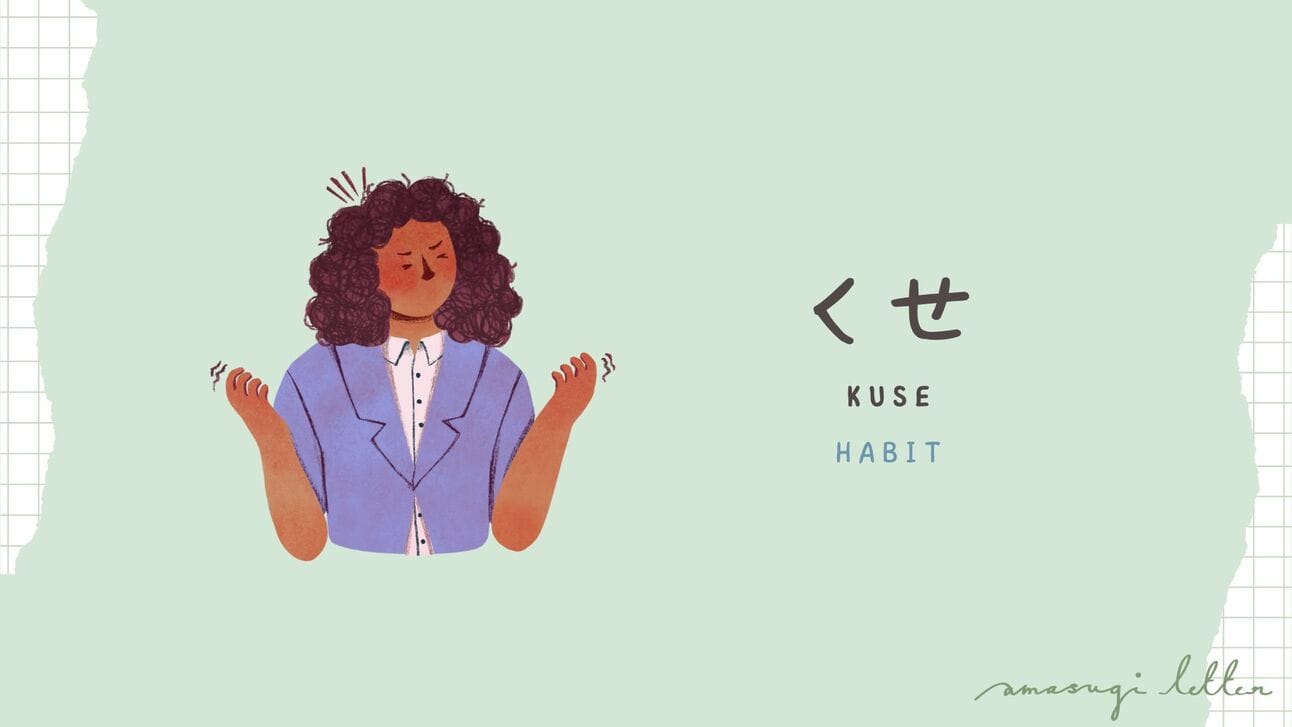- Amasugi Letter
- Posts
- 何の言葉10 くせ(kuse)
何の言葉10 くせ(kuse)
Amasugi Letter

Hi readers!
Do you remember when we talked about ひとりごと (hitorigoto) in our previous post? We mentioned that it can be a good technique if you talk to yourself in your target language.
However, if you are someone who is just saying ひとりごと during inappropriate times and disturbing other people, it means it is developing into a “bad habit”.
So today’s letter we’ll be discussing how you can describe a “habit” in Japanese:


What is くせ?
There are a few meanings of くせ , but as a concept or imagery, it means “tendency of something or someone”:
1. The most common meaning of くせ means “(subconscious) habit”. It is something you do often that you end up doing it without thinking.
For example,
髪をさわる (kami wo sawaru) = touching their hair
爪をかむ (tsume wo kamu) = biting their fingernails
口ぐせ(kuchiguse) = a phrase or word which someone says very often eg, filler words.
Note: Usually it has negative nuances, but sometimes it can have a positive meaning.
For example,
家に帰ったら手を洗う (ie ni kaettara te wo arau) = washing hands when reaching home
毎朝ストレッチする(maiasa sutorecchi suru) = do stretches every morning
2. くせ also has another meaning when it is related to hair.
For example,
髪のくせ (kami no kuse) = natural shape of your hair eg. when your hair tends to stick out or one part of your hair curls in an awkward way.
くせ毛 (kusege) = naturally wavy or curly hair
寝ぐせ(neguse) = bed head
3. Lastly, we can use くせ to mean a “characteristic” of something, however it is mostly used to describe a person’s personality or flavour of food.
For example,
くせがある味 (kuse ga aru aji) = peculiar, unique flavour or food with acquired taste eg. blue cheese, natto, etc.
くせが無い味 (kuse ga nai aji) = food that anyone can accept (because it doesn’t have a strong taste)
くせが強い人 (kuse ga tsuyoi hito) = someone with a weird, eccentric or strange personality that comes off too strong.
How to write くせ?
Usually it is written is hiragana as くせ for daily conversations, but it can also be written in kanji as 癖 or katakana クセ.
English phrases with similar meaning to くせ:
“habit”
“tendency”
“characteristic”

💡”We are all a little weird and life's a little weird” - Dr Seuss
There is a Japanese phrase with the word くせ. Can you guess what it means?
無くて七癖
(nakute nana kuse)
Everyone has at least 7 habits
Related to the 1st meaning of くせ (habit), it means that “even if someone seems like they don’t have any habits, they must have at least 7 that we don’t know about”
or in other words:
“Every person has their eccentricities”.

休みなのに、いつものくせで6時に起きちゃった。
Even though I’m on holiday, I end up waking up at 6am because of my habit.
上司はイライラすると頭をかくくせがある。
My superior tends to scratch his head when he gets irritated.
そのくせ、直した方がいいよ。
You should fix that habit.
忘れものがないか、毎回確認するくせをつけなさい。
You should get in the habit of making sure you didn’t forget your belongings every single time.
髪のくせが強いから、まっすぐな髪にあこがれるよ。
My hair is very curly, so I admire those with straight hair.
Japanese phrases with similar meaning to くせ:
習慣(shuukan)
Practice your くせ
We encourage practicing words that you’ve just learnt and forming sentences related to yourself or your surroundings:
What are some of your くせ?
Do you have any くせがある味 that you like?
How many times have you left your house with 寝ぐせ?
For the 2nd question, my answer is I love ドリアン 🤣
Sincerely,
Amasugi Letter
Send us your feedback → [email protected]
Follow us on instagram → @amasugiletter
Check out our website → amasugi-letter.beehiiv.com
Reply